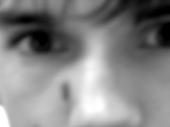Clarification
May 18 2006
While I do believe that cognition (as a process) can be fallible--a word defined by dictionary.com as "capable of making an error"--I do agree that cognition is fundamentally flawed is a better way to describe what I am trying to say.
As for Karissa's contention, I don't think I'm assuming much by saying cognition is fundamentally flawed. Perfect perception (as well as perfect memory) would be unlimited in scope and would not deteriorate over time or because of other circumstances. I think optical illusions serve as a perfect example to this: perfect perception would be also always able to distinguish between what can be perceived in certain way and what can't. A "3d" movie may be perceived by one (sight) faculty to produce tangible objects while the other (touch) faculty perceives not such objects. Also, we are all aware that such faculties can be limited or seemingly expanded by certain outside influences, such as emotion or toxic substances. However, I need more time to produce such logic for each situation, and may not because I feel them a digression to what I'm seriously attempting to accomplish: my ultimate goal is logically to produce proofs for and against the existence of God. Alas, I have a lot of background information (logic) to sift through.
As for Karissa's contention, I don't think I'm assuming much by saying cognition is fundamentally flawed. Perfect perception (as well as perfect memory) would be unlimited in scope and would not deteriorate over time or because of other circumstances. I think optical illusions serve as a perfect example to this: perfect perception would be also always able to distinguish between what can be perceived in certain way and what can't. A "3d" movie may be perceived by one (sight) faculty to produce tangible objects while the other (touch) faculty perceives not such objects. Also, we are all aware that such faculties can be limited or seemingly expanded by certain outside influences, such as emotion or toxic substances. However, I need more time to produce such logic for each situation, and may not because I feel them a digression to what I'm seriously attempting to accomplish: my ultimate goal is logically to produce proofs for and against the existence of God. Alas, I have a lot of background information (logic) to sift through.
yourcandytears
May 20 2006
Actually what I am getting at is that in order to classify perceptions as flawed or not you have to first know if there is a "right" or a "perfect" or an "absolute reality". Of course, because we all perceive things differently we can never know this. What I am saying is in order for there to be a "wrong" or a "flaw" there must first be a "right", for neither of those exists without the other. Do you see what I mean? It's kind of hard to get or explain maybe, but it is a root thought that must be examined before proceeding to say things are flawed. You must first decide if there is one standard everything is measured against. I think, however, that is impossible to know, but, of course, I could be wrong. I like this discussion though :)
adam rodrigues
May 23 2006
My question is, why seek evidence against God? I would think you could come to a series of philosophical conclusions for the purpose of having a deep intellectual affirmation FOR God.
But I guess that's my opinion.














